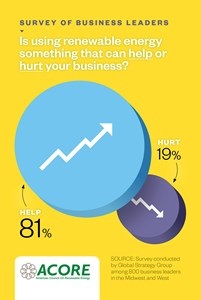This article comes from SNL and is authored by Michael Copley
Roughly eight in 10 business leaders in Midwestern and Western states think that renewable energy can boost their companies’ bottom lines and that the technology presents an opportunity for broad economic growth, according to a poll released June 25 by Global Strategy Group and the American Council on Renewable Energy.
The online survey of 800 business leaders found a majority are concerned about the economic impacts of global warming, favor government investment in renewable energy and support policies to reduce carbon emissions from coal-fired power plants.
The results were “surprising, even to us,” ACORE Communications Director Kevin Haley said during a press conference at the Renewable Energy Finance Forum in New York City. “We wanted to get a feel for how businesses in key regions of the country are thinking about renewable energy, both as a resource and … a business opportunity. And we thought that the data that we got paints a much more positive picture than you’ll oftentimes hear.”
The poll was released at the same time renewable energy advocates are lobbying lawmakers to maintain and extend policies that support the industry. The wind industry is pushing Congress to extend the production tax credit for renewable power generators as part of a broad tax-extenders bill. The solar industry has been angling to add an amendment to the same bill tweaking the investment tax credit to allow more developers to qualify before the credit expires in its current form at the end of 2016. And at the state level, industry groups are fighting to preserve renewable portfolio standards and net energy metering programs, which many consider the backbone of the rooftop solar industry.
Among business leaders surveyed, 70% support government-backed loans for research and development in the renewable energy space; 86% support net metering programs; and 68% favor renewable portfolio standards, compared with 32% who are opposed to requirements that utilities buy certain amounts of renewable power.
The poll follows the U.S. EPA’s release of a proposed rule to cut greenhouse gas emissions at existing power plants, as well as a June 24 report called “Risky Business” that detailed an “overwhelming” number of risks to the U.S. economy from climate change.
“When I see these data, it’s a positive corollary to some of the macro-level stories we’ve been hearing about,” CalCEF Managing Director Dan Adler said of ACORE’s poll results. CalCEF is a San Francisco-based group that sponsors new investment vehicles for renewable energy, from venture capital to project finance.
“Businesses understand now that they can utilize things like zero up-front financing to get solar, to get efficiency. These are the drivers of clean energy deployment in the United States at the consumer level,” Adler said during the press conference. “Obviously we’ve had great success at the infrastructure scale with things like RPS programs and feed-in tariffs. Those are important and will continue to drive bulk renewables installation. But increasingly it’s a consumer story, and that’s where the money is flowing.”
In a 2012 post-election energy survey, 54% of Colorado voters favored more solar development in the state, while 53% wanted to see more wind power. In Iowa, 47% of voters said the state could use more solar while 69% wanted more wind. In Ohio, 46% of voters wanted to see more wind and solar, while 62% said there should be more natural gas development and 37% supported more coal.
In the June 25 poll, more than 85% of business leaders in the West and Midwest said they have a positive view of wind and solar; 56% have a “negative” view of coal-fired power, with 69% supporting federal regulations to limit carbon emissions from coal plants, according to a summary of the results. A June 2 poll from The Washington Post and ABC News found that 70% of respondents said the federal government should limit the release of greenhouse gases from existing power plants in order to reduce global warming.
The ACORE poll came a day after the group issued a report in which several of its members called on electric utilities to play a bigger role in developing renewable energy, particularly distributed generation. While the report focused on the influence utilities could wield in the renewable energy space using their balance sheets and grid expertise, many connected to the renewable energy industry are unsparing in their assessment of the challenges that lie ahead of legacy electricity providers.
“What happens behind the meter is the consumers’ business, period. That’s a message to the energy incumbency, particularly the energy utilities: your business is being responsive to what your consumers ask for, and all this stuff about the utility of the future and what’s going to happen to the incumbent energy business, just listen to what your consumers are asking for, and if you can provide it you’ll do fine,” Adler said. “And if you can’t, you’ll be put out of business, and frankly you deserve to be.”
Filed Under: News, Policy





